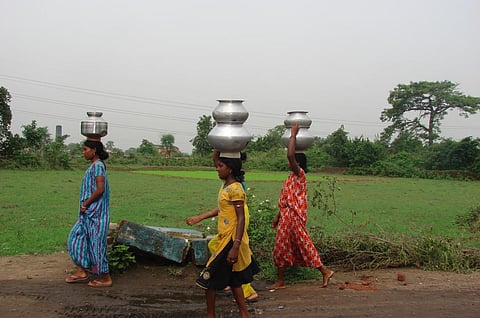

The 15th Finance Commission (FC) has recommended that 60 per cent of rural local bodies’ grants from the central divisive tax pool be spent on water conservation, drinking water provisions and to manage household waste and excreta management, including maintaining the open-defecation free (ODF) status achieved under the Swachh Bharat Mission in 2019. More than half a million villages and 616 districts were declared ODF as on March 31, 2019.
The constitutional body decides how the central tax pool is to be divided among the Union and state governments as well as the third-tier, locally elected bodies like Panchayats and municipalities.
Finance minister Nirmala Sitharaman accepted the 15th FC’s recommendations while presenting the Union budget 2021-22. The commission granted Rs 4,36,361 crore from the central divisive tax pool to local governments — both rural and urban — for 2021-26. Of this, rural bodies would receive Rs 2,36,805 crore.
The grant has both tied and untied components. The tied grant — 60 per cent of the total — has to be spent on water and sanitation-related activities. The remaining 40 per cent is untied: Local bodies are free to chose how to spend it. The total grant will be spent on 29 Panchayat responsibilities mandated by the Constitution.
The tied grant has been equally divided for water and sanitation.
Thirty per cent of the total (Rs 71,042 crore for 2021-26) has been earmarked for providing drinking water, rainwater harvesting and water recycling. An equal amount is:
to be disbursed to rural local bodies shall be earmarked for sanitation and maintenance of ODF status, and this should include management and treatment of household waste, and human excreta and faecal sludge management in particular.
According to the FC’s explanation based on interactions with various government departments, it was a demand from the Union government to make the ODF status sustainable. Besides, the government has a promise of reaching tap water to every household in the country under the Jal Jeevan Mission. The Union government wanted both these objectives to be funded as an integrated way.
Without secured water connections or availability, the threat of villages slipping out of the ODF status is very imminent, as past experiences show. According to the government’s own data, only 41.53 per cent of habitations declared as ODF have piped water supply schemes.
“The Union Government has proposed a combined approach to water and sanitation through convergence between the National Rural Drinking Water Programme (NRDWP) and the SBM-Grameen. Villages which have been verified as ODF are given priority for piped water schemes under the NRDWP,” according to the 15th Finance Commission.